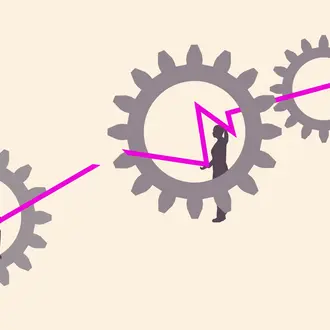Digital Economy
Study: Consumers value online reviews over occupational licensing
Stringent occupational licensing is associated with higher costs, but doesn’t lead to greater consumer satisfaction. Here’s how online reviews might replace licenses.
More than 1,100 occupations, from interior designers to contractors, require licenses in at least one U.S. state. But consumers care more about online reviews and prices than license status when it comes to choosing a service provider, according to new research from MIT Sloan professorand his co-authors.
As consumers increasingly go online to hire service providers, the researchers found that more stringent licensing regulations result in less competition and higher prices but do not boost customer satisfaction, at least when it comes to home improvement services. This suggests well-functioning online measures, like ratings and reviews, could be an effective substitute for professional licenses as a form of quality control.
Brynjolfsson and his fellow researchers — Harvard University professor Chiara Farronato, Stanford University professor Bradley Larsen, PhD ’13, and Boston University professor Andrey Fradkin— studied a large online labor market and conducted a nationwide survey. Their working paper, “Consumer Protection in an Online World: An Analysis of Occupational Licensing,” was published in January.
Licensing exists to protect consumers from poor service and offer a minimum standard of quality and safety. To gauge how licensing affects how people make hiring decisions, Brynjolfsson and his fellow researchers analyzed data from a large U.S. online platform that matches consumers with service providers in different categories, like painting, home renovation, or interior design. (The researchers kept the company anonymous.) Consumers post a job, and service providers respond with a quote.
Consumers are able to see the service provider’s reviews and their starred rating, as well as a badge showing whether the provider is licensed. The badge is only displayed if the provider offers proof of licensing that is verified by the platform. For the study the researchers looked at more than a million requests by consumers in hundreds of categories over eight months.
They found no significant change in providers’ popularity before and after they received the badge signaling a verified license. But researchers did find an increase in the probability of someone getting hired after they received their first review.
Reinforcing this finding, the researchers surveyed 5,219 people who recently purchased home services. Less than 1%, or fewer than 40 people, listed licensing as one of the top three reasons they hired a service provider. Instead consumers said they focused on factors like price, quality of work, reviews, and recommendations.
While 61% of the survey respondents were sure their service providers were licensed, 52% found out only when they signed a contract.
More than 1,100 occupations require licenses in at least one state.
Licenses may factor little in consumer decisions, but requiring them has market costs. By measuring licensing stringency in different states (things like fees, required exams, and age, experience, and education requirements) and comparing it to consumer demand and transaction prices, the researchers found that increased licensing stringency is associated with higher prices and less competition. Yet stringency does not significantly affect the probability of someone getting hired in that area, nor is it associated with higher customer satisfaction.
A cost-benefit analysis tips toward reducing licensing regulations, the researchers said, because low-quality providers can be identified through online feedback, consumers pay more attention to online reputation measures than licensing, and licensing laws impose costs on consumers, like higher prices.
This could change how licensing regulations and digital platforms are designed, the researchers said.
“In particular, the increased availability of alternative signals of quality, such as online reviews, has probably reduced the level of regulatory scrutiny needed for service providers,” they wrote. “Furthermore, these signals may be useful in designing a more data-driven set of licensing regulations and enforcement mechanisms.”




